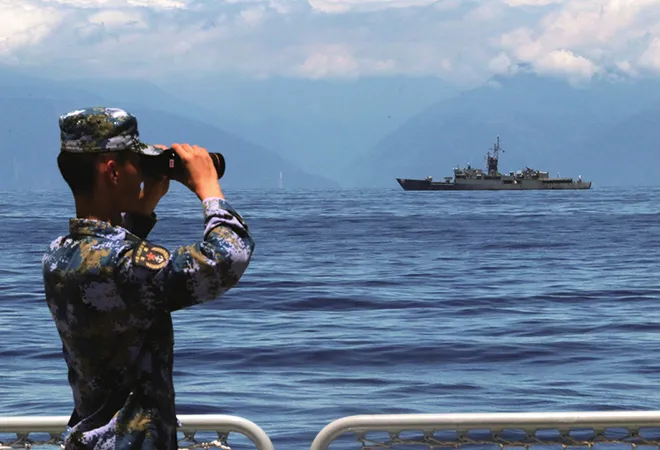-
CENTRES
Progammes & Centres
Location
The Indo-Pacific states confront a real possibility of having China in their strategic backyard if the PRC successfully annex Taiwan in the coming years

The recent drills conducted by the People’s Liberation Army (PLA) near the coast of Taiwan are the latest demonstration of Chinese military power. Beijing dubbed it “strike drills” which were conducted close to the seas and airspace of Taiwan. These drills foreshadow an increasing possibility of invasion of the island, which Beijing treats as a renegade entity.
Earlier, in August 2022, the People’s Republic of China (PRC) conducted extensive war games around the main island of Taiwan, following closely on the heels of the United States (US) House of Representatives Speaker Nancy Pelosi’s visit to Taipei in August 2022. The direct implication of these military exercises is that Taiwan faces the real possibility of invasion, which in past years may have seemed remote.
According to Deputy Director of Central Intelligence Agency (CIA) David Cohen, the Chinese are poised to or at least approaching the capability to invade and capture Taiwan by 2027, which is only four years away at the time of this writing. These comments have been reinforced by the former Indo-Pacific Command Chief Admiral David Davidson who had earlier made a similar statement that the PRC was on the cusp of invading Taiwan within the next five to seven years with the goal of integrating it with the mainland. In fact, in January 2019, Chinese President Xi Jinping declared that Taiwan would be reunified with the mainland by 2050. However, the PRC, has evidently started the process of revising that goal with regard to Taiwan by breaching the median line in the Taiwan Straits, which it generally observed until the August 2022 crisis. Thus, Beijing has very likely accelerated and advanced the 2050 deadline by almost two decades.
The People’s Liberation Army Army (PLAA) has significantly augmented its capabilities by pursuing extensive reorganisation and training in amphibious assault missions reflecting the priority China attaches to the unification of Taiwan.
The PRC has significantly developed the means to execute a successful invasion of Taiwan. For instance, the People’s Liberation Army Army (PLAA) has significantly augmented its capabilities by pursuing extensive reorganisation and training in amphibious assault missions reflecting the priority China attaches to the unification of Taiwan. The People’s Liberation Army Navy (PLAN), for its part, is strengthening a whole range of anti-air, anti-submarine warfare and anti-surface warfare capabilities in a bid to deter any third-party interference in a PRC invasion, be it the US, Japan, or South Korea, individually or collectively.
The People’s Liberation Army Air Force (PLAAF) is also intensifying efforts to secure capabilities for a Taiwan-related contingency with the acquisition of numerous aircraft that will not require mid-air refueling, equipping the PLAAF to execute ground attacks and air assault missions. A dense air defence network, consisting of a range of anti-access/area-denial (A2/AD) systems at several military bases and various population hubs, is also being installed on the mainland. In addition, the PLAAF’s mid-air refuelling capabilities are being enhanced to extend the operational range and endurance of the PLAAF’s fighter wing against third-party interference.
Supplementing these efforts are the People’s Liberation Army Rocket Force (PLARF) preparations to conduct strikes against high-value targets such a Taiwan’s Command and Control (C2) networks, network of radar facilities, missile defence installations, and above all, leadership. The Peoples Liberation Army Strategic Support Force (PLASSF) is working intensively to prepare for the establishment of information dominance by combining cyber and electronic attacks. Finally, the Peoples Liberation Army Joint Logistics Support Force’s (PLAJLSF) primary mission is the provision of joint logistics support at the strategic and campaign level for the PLA. This would involve C2-related logistics, and delivery of supplies ranging from ammunition to medical needs. What are the implications of China’s successful reunification of Taiwan, by military means, for states in the Indo-Pacific region such as Japan, South Korea, the US, and India? The potential loss or the fall of Taiwan to the PRC would pave the way for bringing the First Island Chain (FIC) under direct Chinese threat, along with critical sea lines of communication (SLOC) traversing the region. In addition to Taiwan, the FIC consists of the Kuril Islands, the principal Japanese Archipelago, Okinawa, the Malay Peninsula and the Northern islands of the Philippines. The FIC would serve as a critical gateway for the Chinese to expand their military presence in the Western Pacific.
The Peoples Liberation Army Strategic Support Force (PLASSF) is working intensively to prepare for the establishment of information dominance by combining cyber and electronic attacks.
The consequences would not be insignificant despite the Taiwan theatre’s distance from India, which already confronts the PLA along a highly militarised land frontier. Taiwan’s fall to the Chinese would have serious implications because it will embolden the PRC, and incentivise increased PLAN forays into the Indian Ocean.
New Delhi will be faced with hard choices. It will have to raise defence spending significantly if it is to credibly contest the PRC in the continental and maritime domains; secondly, India will need to deepen its engagement with the Quadrilateral Security Dialogue (QSD) or QUAD countries.
The views expressed above belong to the author(s). ORF research and analyses now available on Telegram! Click here to access our curated content — blogs, longforms and interviews.

Kartik Bommakanti is a Senior Fellow with the Strategic Studies Programme. Kartik specialises in space military issues and his research is primarily centred on the ...
Read More +